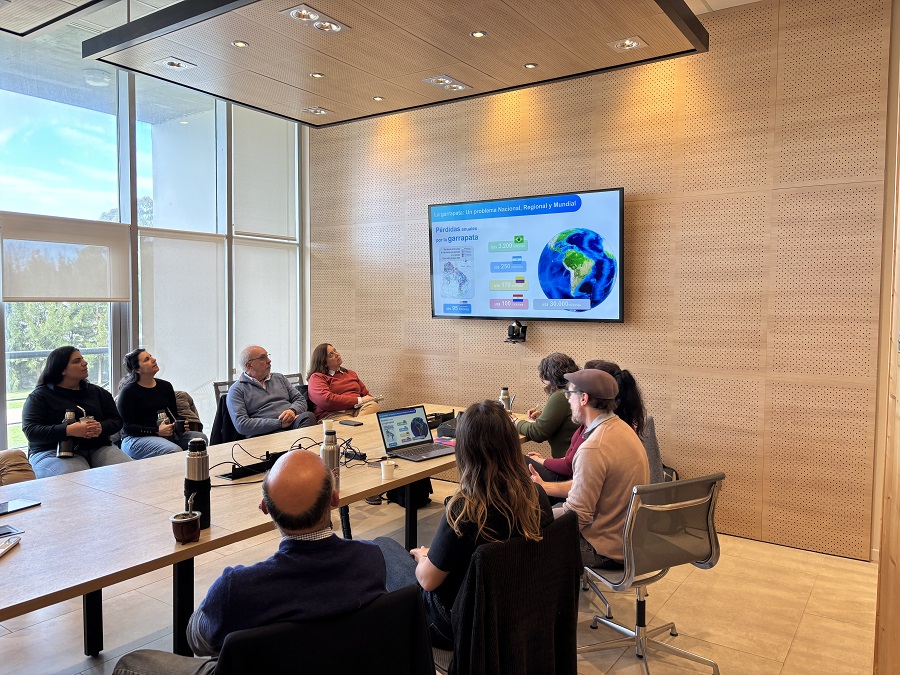Members of the National Academy of Veterinary Medicine, the Veterinary Medicine Society, the School of Veterinary Medicine at Udelar, and the Ministry of Livestock, Agriculture and Fisheries (MGAP) visited the Institut Pasteur de Montevideo for a knowledge-sharing session on the tick vaccine being developed by the startup Scaffold Biotech and the national-scale pilot vaccination program.
Scaffold Biotech, founded by researchers Agustín Correa and Matías Machado, is supported by LAB+, the institute’s company builder in partnership with Ficus Advisory. The company is working with MGAP to carry out a pilot trial of the vaccine, which will begin this November at eleven livestock farms across different regions of the country.
At the start of the meeting, institute director Carlos Batthyány introduced the startup and its connection to LAB+ and the Institut Pasteur de Montevideo. “From the beginning, we believed Uruguay had the right conditions to develop solutions in animal health: stability, being a small country, having a large livestock population, and being part of Mercosur,” he highlighted.
Correa opened the presentation by pointing to the US$95 million lost annually in Mercosur countries due to tick-borne diseases in cattle. “The main strategy for producers is the use of acaricides. The problem is that resistant tick strains emerge. This leads to issues such as environmental contamination and residues in final products, which affect consumer health and impact export markets,” he explained.
He went on to describe the development of the vaccine and how it works: cattle are inoculated with a tick antigen, which triggers an immune response against the parasite. When the tick feeds on the cow, it ingests the antibodies, which cause anything from infertility to death. This mechanism also makes the vaccine easily adaptable to tick strains from other parts of the world. In addition, acaricide resistance does not affect its effectiveness, and it leaves no residues in the meat.
Correa emphasized that their most recent field trial, conducted in Rivera, showed 90% efficacy. Now, a pilot trial will begin as part of the National Tick Control Plan in collaboration with MGAP. Cattle at eleven farms, located in eight departments and with varying levels of tick infestation, will be vaccinated. The trial is scheduled to conclude in April 2026.
“This isn’t a magic solution—it will be part of an integrated plan alongside other available tools, like acaricides. It will also follow a three-dose vaccination schedule, administered every six or twelve months,” noted Manuela Cilintano, veterinarian and technical director of the startup.

After the presentation, the floor was opened for questions and comments. The first concerned who would administer the vaccine in the pilot trial. Scaffold representatives explained that ministry staff at each site will handle administration, with support from the startup and the Institut Pasteur de Montevideo. Other questions addressed the various trials carried out in recent months.
Another important topic discussed was the need to manage expectations among livestock producers to ensure the vaccines are used appropriately.
The meeting concluded with all parties expressing their commitment to continued collaboration to ensure the success of the planned trials and further progress in the development of the vaccine.

